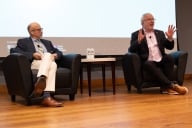You have /5 articles left.
Sign up for a free account or log in.
The University of Arkansas System’s new online institution will face a crowded field of distance education providers when it launches in 2015. While its backers say they are mindful of other states’ missteps, faculty members and industry analysts are already questioning the institution's chances.
On Thursday, just weeks before Arkansas is set to license its 101st distance education provider to operate in the state, the university system’s Board of Trustees approved eVersity, an institution that will compete to attract adult learners. Organizers now have until the fall of 2015 to recruit faculty from across the system’s 17 four-year institutions, community colleges and other members, seek $10 million in startup funding and build products that surpass those offered by for-profit entities with decades of experience.
“It’s a lot like the Titanic trying to avoid the iceberg,” Donald R. Bobbitt, president of the university system, said.
When asked why the university system needs to launch a fully online degree-granting institution, supporters of the idea tend to point to one number: 49. That’s where Arkansas ranks in the country in educational attainment, defined as the percentage of adults with bachelor’s degrees. The Lumina Foundation also estimates that in 2010, 358,000 Arkansans had started college not but did not finish.
In response to the dismal ranking, Governor Mike Beebe in 2011 called on the state to double the number of Arkansans with a bachelor’s degree by 2025. The board responded in November 2012, passing a resolution that pledged to expand the number of online offerings in the state.
Arkansas joins a number of other states, including Florida, Illinois and Texas, that have attempted -- with varying degrees of success -- to expand access to higher education by creating a flagship online institution. Illinois’s effort, known as Global Campus, folded less than two years after its launch. The University of Florida Online, not even three months old, is already looking to replace its director, who resigned two weeks ago.
Bobbitt and Michael Moore, the system’s vice president for academic affairs, came to the Arkansas system from the University of Texas at Arlington, and both said they are mindful of lessons learned from other states.
“We were very deliberate and thoughtful in looking at different models,” Bobbitt said. “I would say the model that we have adopted was not our first option when we were first working through the decision, but I would say that after we started working through the various models, it quickly rose to the top.”
A 'Coalition of the Willing'
Take the Florida model, for example. On one hand, UF Online operates as an entity within the university, and therefore does not need to seek independent accreditation. On the other, Moore said, creating an independent institution grants the system the advantage of having a “green field” that isn’t burdened by “legacy structures and legacy policies.” eVersity will therefore launch as a consortium within the university system, then pursue its own accreditation from the Higher Learning Commission of the North Central Association of Colleges and Schools.
The original concept for Global Campus, meanwhile, was rejected by the faculty senates at the University of Illinois’ three campuses. The university planned to launch it as a for-profit institution run by outside instructors, but faculty members demanded both oversight and a nonprofit status.
Arkansas, in comparison, plans to assemble a “coalition of the willing” from institutions in the system, Moore said. The courses will be created and taught by existing tenure-track faculty members, not adjuncts hired only to teach online. Faculty also “absolutely have to be involved in governance and settling curriculum matters.”
Moore said he expects pockets of faculty will have no interest in teaching online. “If one faculty member or if one particular group of faculty members are not particularly supportive, that’s fine,” he said. “All that we ask is that the faculty who do oppose do not stand in the way.”
Thursday’s announcement answered some of the questions faculty members have been asking for years, but Janine A. Parry, president of the Faculty Senate at the University of Arkansas at Fayetteville, said there are still “lots of unknowns.”
Parry and Timothy A. Kral, professor of biological sciences, expressed a list of concerns in a December 2012 letter to the board.
“In closing, we emphasize again that we support ramping up the university’s investment in the quantity, and quality, of distance delivery,” Kral and Parry wrote. “But that investment is already well under way on our existing campuses and is happening under the direction of nationally recognized faculty with the qualifications, experience and incentives to maintain a high quality curriculum proven to offer a positive return to students, communities, and the economy.”
Bobbitt responded to the letter point by point, but Parry said she felt she “got no reply, except for, ‘Thank you very much.’ ”
“The board is, I think, doing what many boards in higher education do -- and most of the time we’re grateful for -- which is being really deferential to system leadership,” Parry, professor of political science, said. “We keep hearing generalities about faculty governance. I think President Bobbitt and Dr. Moore ... make the right noises and the board says O.K., but the faculty still have a lot of questions about what this will mean for workloads -- we’re already stretched pretty thin at the University of Arkansas.”
A 'Shortsighted' Estimate?
“To some extent, the devil’s in the details,” Moore said. The system has yet to estimate how many students and programs it hopes to launch eVersity with, how many key hires need to be made and how much students will pay for tuition (Bobbitt estimated eVersity will be “marginally more expensive than community college, but at or below [the cost of] four-year institutions”).
Those are among the questions that will need to be answered now that eVersity has been cleared to launch, Moore said.
Some details, however, have already been settled. Global Campus borrowed $7 million from the University of Illinois, but eVersity does not want to be a drag on the state’s or the system’s finances, Bobbitt said. After raising the $10 million from different sources, eVersity will neither apply for nor accept public funds, he said.
That may make eVersity more appealing to out-of-state students, since it would eliminate the difference between in-state and out-of-state tuition, Moore pointed out. “Our first priority as a public institution will be to the citizens of the state,” he said, but “at some point, yes, we’ll be interested in going outside the state.”
Kenneth E. Hartman, a senior fellow and principal analyst for the consulting firm Eduventures, said launching eVersity may still be more complicated -- and more expensive -- than the Arkansas system anticipates.
“All of that sounds good on paper, but in practice it’s going to be very challenging,” Hartman said. “You’re dealing with a state institution, you’re dealing with multiple entities with multiple agendas, and in some cases, multiple perceptions of what it’s going to require to successfully teach and graduate adult learners.”
Hartman called the $10 million estimate “shortsighted,” and recommended Arkansas seek out third party online “enablers” -- companies such as Academic Partnerships and Pearson Embanet -- to avoid burning through its budget.
Outsourcing is “not high on my list,” Moore said, but added, “We will -- where it makes sense -- look to private companies to help assist us with ways to help reinvent the university.”
As an example, he said existing online offerings, which include programs from the campuses in Fayetteville and Little Rock and a consortium of three community colleges, have been hampered by the system’s inability to aggressively market them.
“There are a lot of things we’ve learned from the for-profits on how to structure that stuff,” Moore said.
If eVersity is unable to quickly show prospective customers that it can provide better courses and better outcomes than it competitors, Hartman said, students will “vote with their clicks” and study elsewhere.
“Online learning is like a big swimming pool,” Hartman said. “The water is warm, it’s inviting, but unless you know where the deep end is and the shallow end is before jumping in, one of two things is going to happen: You’re either going to break your neck, or you’re going to drown.”








